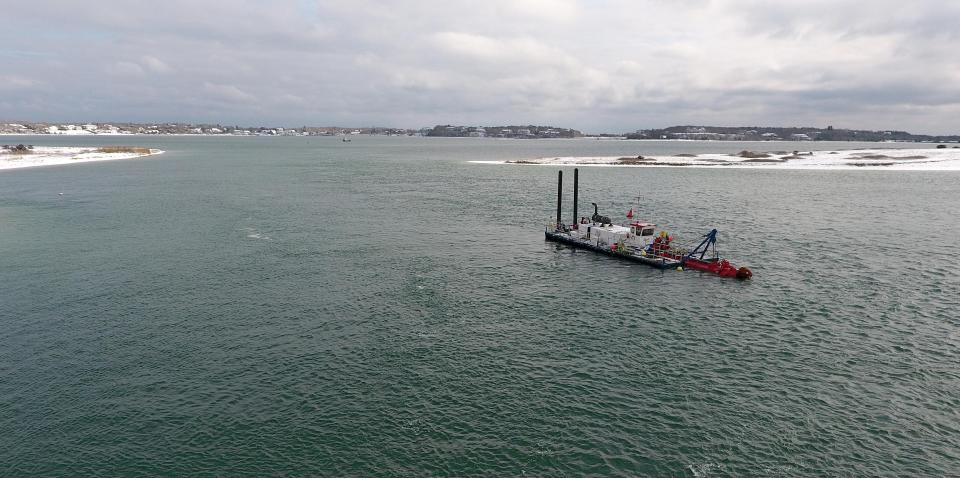'Keep our channels open.' Six Cape towns receive $5.65M to retain boat access to ocean
Six commercial fishing boats, three search and rescue vessels and another 150 or so boats are tucked into the public and private docks and mooring field in Allen Harbor. It’s a small Cape harbor, relatively speaking, with a short channel that doglegs to the sea. But if that channel isn’t dredged every year, it would close off access to the ocean for commercial and recreational boaters.
So it was welcome news to Harwich and five other Cape towns when the state announced Thursday $5.65 million in grants for seven dredge projects.
“You want to talk about the economy and tourism and people coming for the beaches?” Harwich Harbormaster John Rendon said. “If we didn’t have support from the state, it would be difficult to keep our channels open."

Harwich received $50,000 to dredge 8,000 cubic yards of sand. It will open up navigation channels and the sand will be used to replenish town beaches. It’s something all Cape towns need to do because of the wind and water currents that are constantly moving sand around the peninsula.
Chatham received the most in grant money: $1 million for improvements at the Bridge Street waterfront and another $500,000 to dredge Stage Harbor. The harbor has experienced severe and recurrent shoaling over the last few years, according to Shanna Nealy, Town Manager Jill Goldsmith's spokesperson. Money from the state Executive Office of Economic Development, which funds the dredging program, has allowed for repeated dredging of Stage Harbor. Without that dredging, boating would come to a standstill for many, according to Theodore Keon, the director of coastal resources in Chatham.
“Maintaining navigation channels is literally maintaining the lifeblood of the maritime community,” Keon said. “Especially if you have a large commercial fleet.”

But it's not just commercial fishermen who stand to benefit.
A survey of business owners surrounding six harbors in four towns found harbors had a huge economic impact on the region. A 2020 survey by the Cape Cod Commission found employee compensation from the top 10 industries surrounding Provincetown Harbor, Sesuit Harbor in East Dennis, Stage Harbor and Aunt Lydia’s Cove in Chatham, and Great Harbor and Inner Harbor in Falmouth was close to $257 million.
The study has been used to justify the need for dredging and capital improvement funding.
The Cape took the lion’s share of the awards announced. The Seaport Economic Council awarded a total of $3.1 million in grants and the Massachusetts Dredging Program awarded a total of $5 million in grants. The details are listed below.
Barnstable: $300,000 to dredge 17,000 cubic yards from Cotuit Bay entrance and embayment channels. Harbormaster Brian Taylor said the sand would be used to replenish areas on Dead Neck or Sampson’s Island, both important barriers that protect the bay from coastal storms
Chatham: $1 million from the Seaport Economic Council on Bridge Street waterfront improvements. Those improvements will include a shellfish upwelling facility and Americans with Disabilities Act-accessible floats for public boating access.
Chatham: $500,000 to dredge 28,000 cubic yards from Stage Harbor, install concrete floating docks and build a shellfish lab and propagation facility.
Eastham and Orleans: The towns received $1.3 million to dredge 24,000 cubic yards from Rock Harbor channel. The harbor hosts two public boat ramps, about 100 dockage slips, and one of the largest sport fishing fleets in Massachusetts. The harbor’s offloading infrastructure serves about 30 commercial fishing vessels. Those vessels brought in more than $4 million in commercial landings in Orleans and Eastham in 2021.
Harwich: $50,000 to dredge Allen Harbor. More than $4.6 million in commercial catch was landed in Harwich in 2021.
Wellfleet: A $2.5 million grant will be used to dredge 100,000 cubic yards of material from the South Anchorage in Wellfleet Harbor. Dredging will restore all-tide access to the area for up to 315 commercial and recreational vessels and improve conditions for shellfish propagation. Wellfleet was the second most productive shellfishing port in the state in 2021. It supports 90 shellfish growers, 265 acres of aquaculture and brings in an estimated $8 million in commercial landings.
Denise Coffey writes about business and tourism. Contact her at dcoffey@capecodonline. Follow her on Twitter: @DeniseCoffeyCCT.
Thanks to our subscribers, who help make this coverage possible. If you are not a subscriber, please consider supporting quality local journalism with a Cape Cod Times subscription. Here are our subscription plans.
This article originally appeared on Cape Cod Times: Cape towns to use state $5.6M to dredge boat lanes, replenish beaches

